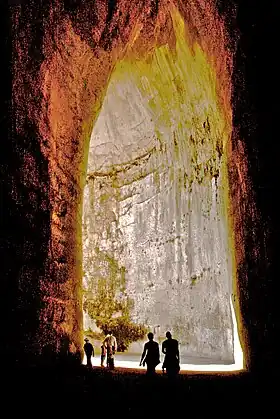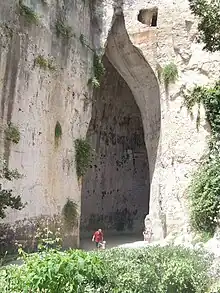| Orecchio di Dionisio Ear of Dionysius | |
|---|---|
| Orecchio di Dionisio | |
 | |
| Location | |
| Coordinates | 37°04′34.45″N 15°16′34.50″E / 37.0762361°N 15.2762500°E |
| Depth | 70 metres (230 ft) |
| Length | 65 metres (213 ft) |
| Elevation | 400 amsl |
| Entrances | 1 |
| Website | Orecchio di Dionisio |
The Ear of Dionysius (Italian: Orecchio di Dionisio) is a limestone cave carved out of the Temenites hill in the city of Syracuse, on the island of Sicily in Italy. Its name, given by the painter Michelangelo da Caravaggio, comes from its similarity in shape to the human ear. The name is also linked to echoes in the cave.
Geology

The Ear of Dionysius was most likely formed out of an old limestone quarry. It is 23 metres high and extends 65 metres back into the cliff. Horizontally, it bends in an approximate "S" shape; vertically it is tapered at the top like a teardrop. Because of its shape, the Ear has extremely good acoustics, making even a small sound resonate throughout the cave.
Purpose
This cave was dug in Greek/Roman times to provide water storage for Syracuse. A narrow tunnel was dug first. This tunnel was widened by digging down and sideways afterwards, giving the cave its unusual shape. The small narrow tunnel is still visible on the top of this artificial cave. An earthquake struck this area causing damage, and the cave became unusable for water storage afterwards.
The cave was named after Dionysius I of Syracuse who used the cave as a prison, and would listen to hear what his prisoners were saying about him through the echoes in the cave.
History
The name of the cave was coined in 1608 by the painter Caravaggio,[1] who was shown the grotto by the mathematician, antiquarian and archaeologist Vincenzo Mirabella. It refers to the tyrant Dionysius I of Syracuse. According to legend, Dionysius used the cave as a prison for political dissidents, and by means of the perfect acoustics eavesdropped on the plans and secrets of his captives. Another legend claims that Dionysius carved the cave in its shape so that it would amplify the screams of prisoners being tortured in it. The sound-focusing effect can no longer be heard because access to the focal point is no longer possible. The visitors of the cave can however still hear the echo while they are in the Ear of Dionysius.
Because of its reputation for acoustic flawlessness, the Ear of Dionysius has also come to refer to a type of ear trumpet that has a flexible tube. The term 'Ear of Dionysius' can also refer to surveillance, specifically for political gain.
In popular culture
The cave is featured as the location of the tomb of Archimedes in the 2023 film Indiana Jones and the Dial of Destiny.
See also
Notes
- ↑ "Turismo a Siracusa - Algila". Retrieved 28 May 2018.
References
- Mike Metras (19 June 2013). Sicily's Historic Coasts. Lulu.com. p. 111. ISBN 978-1-4303-2530-7.
External links
![]() Media related to Ear of Dionysius at Wikimedia Commons
Media related to Ear of Dionysius at Wikimedia Commons

